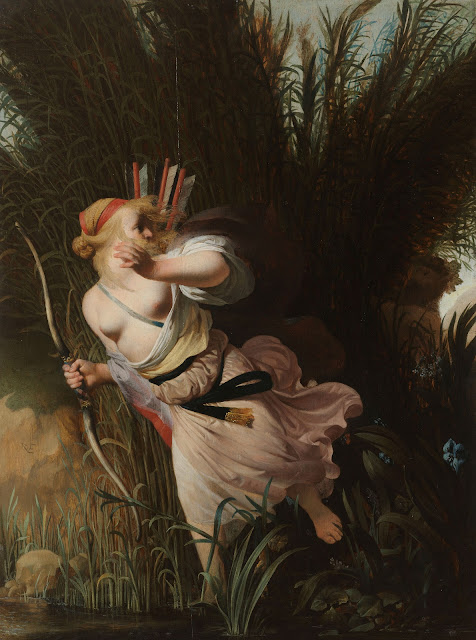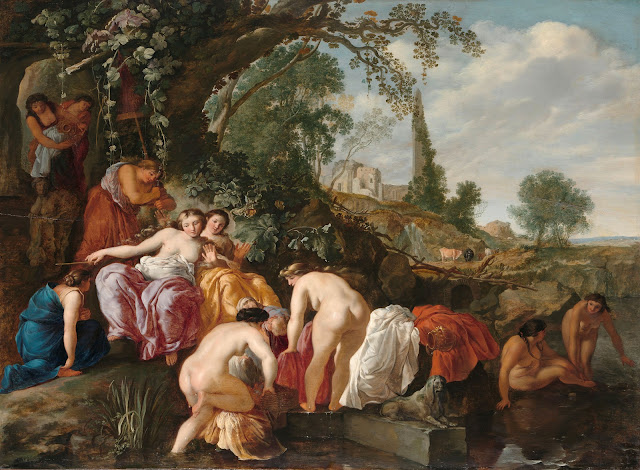 |
| Caesar van Everdingen Pan and Syrinx ca. 1637-40 oil on panel Rijksmuseum, Amsterdam |
 |
| Moses van Uyttenbroeck Bathing Nymph surprised by Satyr ca. 1630-35 oil on panel Rijksmuseum, Amsterdam |
from Dunt: a poem for a dried up river
Very small and damaged and quite dry,
a Roman water nymph made of bone
tries to summon a river out of limestone
very eroded faded
her left arm missing and both legs from the knee down
a Roman water nymph made of bone
tries to summon a river out of limestone
exhausted utterly worn down
a Roman water nymph made of bone
being the last known speaker of her language
she tried to summon a river out of limestone
little distant sound of dry grass try again
a Roman water nymph made of bone
very endangered now
in a largely unintelligible monotone
she tries to summon a river out of limestone
little distant sound as of dry grass try again
– Alice Oswald (2016, from Falling Awake, published by Norton)
 |
| Moses van Uyttenbroeck Finding of Moses ca. 1625-27 oil on panel Rijksmuseum, Amsterdam |
 |
| Joachim von Sandrart Odysseus and Nausicaa ca. 1639 oil on canvas Rijksmuseum, Amsterdam |
 |
| attributed to Johann Carl Loth Selene and Endymion ca. 1660-80 oil on canvas Rijksmuseum, Amsterdam |
A Fig for Selene
Charlotte went walking in the park at evening
While the dusk hung there, windowed west with sun
And east with moon that overlooked the wall.
Said she:
What if the moon be ashes?
They say the moon is arid
Cinders of dead volcanoes.
What if her light be feigning
And gloze this brick I am treading
With rosy-silver mocking?
What if the dead be dead
And vanished altogether
And loveliness be but ashes?
Slowly Charlotte travelled the brick walk,
Cutting a rose-pale circle in the grass
That breathed upon her with a warm night-smell –
The multitudinous, the living grass.
Soon he will come to meet me –
(Quick blood halts and listens!)
Come like a big dark bird
Flown in from a bare bright world.
He will feather me soft with silence,
Nest me in with possession,
Scatter the ashen moonshine . . .
Blood still pounds in its tunnels,
Courses in hidden splendor
Like running flame in the pulses –
What if the moon be ashes!
– Josephine Pinckney (1932, published in Poetry)
 |
| Willem Cornelisz Duyster The Tric-Trac Players ca. 1625 oil on canvas Rijksmuseum, Amsterdam |
 |
| Wouter Crabeth the Younger Incredulity of Thomas ca. 1626-30 oil on canvas Rijksmuseum, Amsterdam |
 |
| Gerrit van Honthorst Crowning with Thorns ca. 1622 oil on canvas Rijksmuseum, Amsterdam |
 |
| Gerrit van Honthorst Shepherd playing the Flute to Four Shepherdesses 1632 oil on canvas Rijksmuseum, Amsterdam |
from Pastoral Dialogue
Remember when you love, from that same hour
Your peace you put into your lover's power;
From that same hour from him you laws receive,
And as he shall ordain, you joy, or grieve,
Hope, fear, laugh, weep; Reason aloof does stand,
Disabled both to act, and to command.
Oh cruel fetters! rather wish to feel
On your soft limbs, the galling weight of steel;
Rather to bloody wounds oppose your breast.
No ill, by which the body can be pressed
You will so sensible a torment find
As shackles on your captived mind.
– Anne Killigrew (1660-1685)
 |
| Gerrit van Honthorst Satyr and Nymph 1623 oil on canvas Rijksmuseum, Amsterdam |
 |
| workshop of Gerrit van Honthorst Putti with Flower Garland ca. 1650 oil on canvas Rijksmuseum, Amsterdam |
 |
| Gerbrand van den Eeckhout Continence of Scipio ca. 1650-66 oil on canvas Rijksmuseum, Amsterdam |
 |
| Aelbert Cuyp Portrait of a Young Man ca. 1640-60 oil on panel Rijksmuseum, Amsterdam |
 |
| Jacob de Gheyn II Venus and Cupid ca. 1605-1610 oil on panel Rijksmuseum, Amsterdam |
An Ode
The merchant, to secure his treasure,
Conveys it in a borrowed name;
Euphelia serves to grace my measure,
But Cloe is my real flame.
My softest verse, my darling lyre,
Upon Euphelia's toilet lay;
When Cloe noted her desire
That I should sing, that I should play.
My lyre I tune, my voice I raise,
But with my numbers mix my sighs;
And whilst I sing Euphelia's praise,
I fix my soul on Cloe's eyes.
Fair Cloe blushed; Euphelia frowned;
I sung and gazed; I played and trembled;
And Venus to the Loves around
Remarked how ill we all dissembled.
– Matthew Prior (1664-1721)